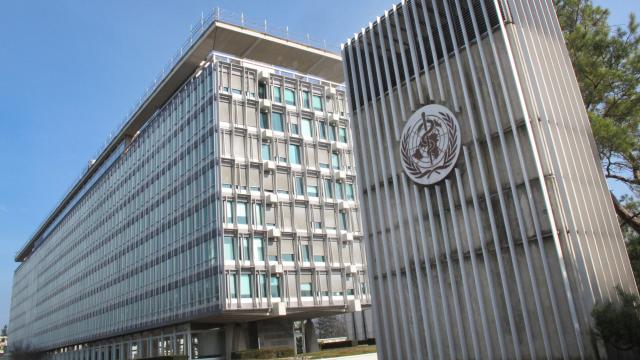The World Health Organisation HQ in Geneva, Switzerland.
With its endless parade of alleging that the US threatened Ecuador and the World Health Organisation this spring over an international resolution to encourage breastfeeding at the behest of infant formula manufacturers is headache-inducing.
According to the Times, the proposal at the World Health Assembly, the governing body of the UN-affiliated World Health Organisation (WHO), was considered a rubber-stamp issue because of the wide array of scientific evidence showing breastfeeding is generally healthier for mothers and babies. It didn’t make it harder for anyone to access formula, which certainly has its uses. It just asked signatories to promote and support breastfeeding and take measures to fight misleading marketing claims spread by formula manufacturers in attempts to get around controls on advertising.
But then the US barged in like they owned the place and started making wildly disproportionate threats of retribution against Ecuador, the country which had planned to introduce the resolution, and later the WHO itself, the Times wrote:
Then the United States delegation, embracing the interests of infant formula manufacturers, upended the deliberations.
American officials sought to water down the resolution by removing language that called on governments to “protect, promote and support breast-feeding” and another passage that called on policymakers to restrict the promotion of food products that many experts say can have deleterious effects on young children.
When that failed, they turned to threats, according to diplomats and government officials who took part in the discussions. Ecuador, which had planned to introduce the measure, was the first to find itself in the cross hairs.
The fight over formula, a $US70 ($94) billion industry largely controlled by Western firms, has long been contentious. That’s due to widespread allegations some companies that make formula push it with dubiously legal or ethical tactics like lavish promotional agreements with doctors and misleading health claims, particularly in poor countries where many are hard-pressed to afford formula in the first place. Then there’s the fact that in some countries with poor manufacturing standards, locally produced alternatives to the expensive foreign-made formula brands can be dangerous.
But, of course, all nuance is lost with the Trump administration when anyone does anything not in line with the preferences of corporations with powerful lobbies. Specifically, the Times wrote the US threatened Ecuador with “punishing trade measures” and withdrawals of “crucial military aid” designed to offset unprecedented violence spilling over the Colombian border, intimidating the nation into dropping the proposal. At least a dozen other countries, “most of them poor nations in Africa and Latin America,” declined to sponsor it instead, the paper added.
During the negotiations, the US side also allegedly threatened to cut funding for the WHO, which would cause serious damage as the US currently provides $US845 ($1,137) million in annual funding, about 15 per cent of the organisation’s budget. (Reminder that the WHO has handled really important stuff like eradicating smallpox and administering experimental Ebola vaccines.)
“We were shocked because we didn’t understand how such a small matter like breast-feeding could provoke such a dramatic response,” an unnamed Ecuadorian official told the Times.
Health and Human Services, the federal agency which led the fight against the resolution, told the paper that the original document created “unnecessary hurdles for mothers seeking to provide nutrition to their children,” but denied threatening Ecuador.
Eventually, the Russian delegation of all people intervened and sponsored it instead, with one unnamed official calling out the US for bullying behaviour:
“We’re not trying to be a hero here, but we feel that it is wrong when a big country tries to push around some very small countries, especially on an issue that is really important for the rest of the world,” said the delegate, who asked not to be identified because he was not authorised to speak to the media.
The resolution passed, but the US successfully carved out part of their pound of flesh, per the Times. First, they stripped the proposal of language calling for the WHO to provide technical support for member nations seeking to end “inappropriate promotion of foods for infants and young children.” Second, they added the words “evidence-based” to language referring to breastfeeding promotion programs. The Times wrote this seemed to be a deliberate jab at the fact it is hard to ethically conduct scientific research on the effects of various feeding methods on babies, and thus a potential way to undermine the resolution: Just say that the evidence doesn’t meet arbitrary standards.
The paper also reported that the US stripped language supporting soda taxes “from a document that advises countries grappling with soaring rates of obesity,” and unsuccessfully attempted to kill a draft roadmap to modify pharmaceutical patent laws to increase access to critical medicines.
Under Trump’s tenure, the US has seemingly gone on a baffling crusade to piss off as many other countries as possible, including throwing tantrums at the G-7 conference, starting a trade war with China, and withdrawing from the UN Human Rights Council. Health and science issues have in no way been immune to the wrecking ball, with the US withdrawing from climate agreements and slashing funding to international family-planning organisations that provide abortion services.
Then there’s the personal dimension: As Vox noted, Trump himself has made repeated references to finding breastfeeding “disgusting.”
The TIME Magazine cover showing late age breast feeding is disgusting–sad what TIME did to get noticed. @TIME
— Donald J. Trump (@realDonaldTrump) May 14, 2012
This is just another drop of spite in a sea of pettiness, but that doesn’t make it any less terrible.
